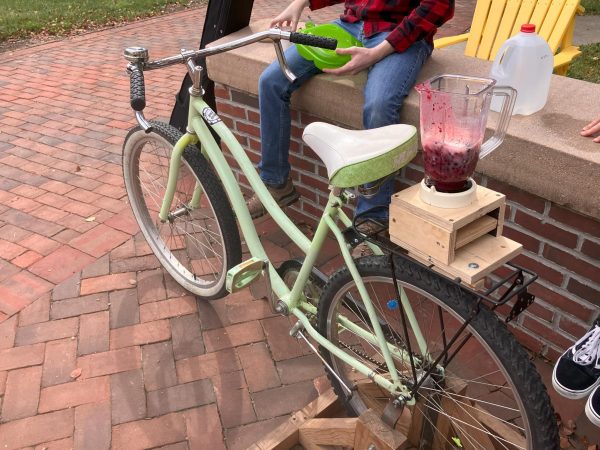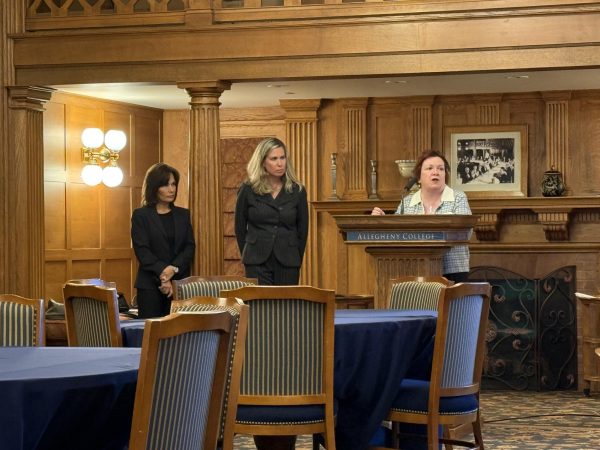Abbott testing inventory shortages reach Allegheny
Company destroyed testing components at Maine facility after demand drop
The student entrance of the Wise Athletic Center, where members of the Allegheny community go to access routine surveillance testing.
As of Monday, Sept. 13, the Allegheny College community will get their noses swabbed by kits from Inspire Diagnostics instead of Abbott Laboratories’ BinaxNOW rapid tests. The decision, announced via email on Friday, Sept. 10, came as a result of supply shortages of the BINAX test, a shortage with origins earlier in the summer.
According to a New York Times article from Aug. 20, Abbott ordered the destruction of 8.6 million testing cards at a manufacturing plant outside Portland, Maine. In a response to the article released that same day, Abbott justified the move by citing a drop in testing demand.
This drop was primarily driven by the Center for Disease Control’s June announcement that fully vaccinated individuals do not need to get tested merely for being exposed to someone who has the virus. The CDC revised their guidelines again in July, re-recommending the practice.
The company also cited what they believed to be sufficient reserves of their product based on market forecasts
“At that time, Abbott had significant amounts of finished test kits in inventory to supply expected demand,” the company wrote.
But the CDC’s renewed guidance, combined with the beginning of many schools’ and universities’ academic years, led Dr. Sean Parsons, CEO of Australian medical firm Ellume, to say in mid-August that demand for an at-home test was 1,000 times what Ellume had projected. Ellume produces an at-home rapid test that competes with Abbott’s BinaxNOW.
To understand Abbott’s further responses to the Times’ article, it is important to understand how the BinaxNOW test functions. According to the FDA, the test card has two lines of antibodies suspended where the either positive or negative indications are given. One set of antibodies is a control set, while the other is specific to COVID-19.
Once a nasal sample is taken from a patient, it is mixed with a chemical reagent on the test card. The resulting chemical reaction either displays one line for a negative result, or two lines for a positive result. So while the test card is an integral part of the test, it is not the test in its entirety, and on that technicality Abbott defended itself again.
“We have not destroyed any finished BinaxNOW product, nor have we destroyed any usable test components needed by the market that could have been donated,” the company wrote in their statement. “In fact, because Abbott maintained usable test components, we’re now able to scale up (production).”
The Times’ reporting also included photos of specific lot numbers of test cards that were designated to be destroyed. According to Abbott’s statement, those lots were “at a seven-month shelf life and were disposed of in accordance with our standard inventory management process.”
However, the Times’ article cites anonymous employees as saying that some of the test cards shredded had expiration dates into early February 2022, and the article includes photographs of expiration dates in the first week of that month.
The Times’ article also quoted Amal Barakat, a virologist with the World Health Organization, regarding Abbott’s decision not to donate any of the testing components and destroy them instead.
“My heart, it hurts,” Barakat stated.
Barakat specifically cited Lebanon as one country under her purview that was struggling to acquire tests, and said that some laboratories were importing whatever they could, regardless of if it had been approved or not
Abbott’s statement implicitly dismissed these concerns by referring to the necessary trade regulations that BinaxNOW would have to follow to be internationalized.
“It would have taken months to complete manufacturing, create individualized regulatory filings in countries, obtain regulatory approvals, ship product overseas in exact specified storage conditions, and then get it to the people who need it—too late for the product to be widely used” Abbott wrote.
Seeming to anticipate the company’s statement, Barakat shot down the idea that trade regulations would keep tests out of the noses of Lebanese citizens.
“This is just paperwork,” Barakat is quoted as saying in the Times.
Regardless, the shortage does not worry the Allegheny College Health Agency. In their announcement of the transition away from BinaxNOW, Dr. Gabrielle Morrow wrote, “we will return to the Inspire app and website that we used so successfully last year to keep our community safe.”
Inspire does not produce its own tests. Rather, the company uses AccessBio’s Carestart rapid antigen test, and there have been no indications of a shortage from AccessBio. However, the Carestart test is less accurate than the BinaxNOW test at detecting COVID-19, with Carestart detecting 88.4% of positive cases to BinaxNOW’s 97.1%. BinaxNOW is also considered to be the single cheapest rapid antigen test on the market at $5 per unit, though Carestart cost per unit varies and price Allegheny pays for each test is not publicly available.
ACHA and Ellen Johnson, vice president for Enrollment Management, declined to comment and referred The Campus to its Sept. 10 announcement.

Sami Mirza is a senior from many different places. He is majoring in International Studies with a focus on the Middle East and North Africa and minor in...










